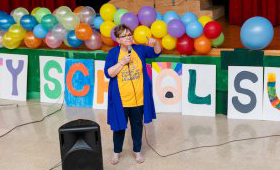Albany, NY — Current and former foster youth along with state legislators and dozens of advocates from across New York gathered at the Capitol today to launch the Youth in Care Coalition’s Foster College Success Campaign, a broad-based undertaking to highlight the obstacles that foster youth face in trying to advance their education, with the goal of raising awareness of these issues amongst all state legislators. This was the coalition’s first effort in its goal to see all college-age foster youth offered a fully supported education at New York State’s colleges and universities.
Higher education outcomes for New York’s young people either in foster care or aged out are particularly dispiriting. Only about one out of every five of them ever enroll at any kind of college or university. And they don’t fare well from there. National data indicates that only 3 percent of these foster youth ever graduate.
In conjunction with the campaign’s launch, the Coalition also announced the release of a major report on foster youth’s higher education challenges: Fostering Independence: The Need for a Statewide Foster Youth College Success Initiative. The study, authored by the Community Service Society in cooperation with the Youth in Care Coalition, documents the daunting circumstances that college-age youth both in foster care or aged out confront as they begin to consider college and a career.
“We know that young people in foster care, as well as those who have aged out, face overwhelming challenges,” said Assemblywoman Donna Lupardo (D-Binghamton, home to about 300 youth in foster care). “We need to break down the barriers to a college education and help these individuals achieve it.”
In addition to tuition bills and other expenses that are too often beyond reach, foster youth struggle to navigate the complex processes required to gain admission, seek out financial aid and obtain other support services.
“Every year, there are 4,000 college-aged young people either discharged from foster care or still in the system,” said Assemblymember Deborah Glick (D-New York City, home to about 13,000 youth in foster care), “but they go to college at about a third of the rate as public school teens not in foster care, frequently due to limited finances. This is a huge problem, but it’s one we can fix.”
Aretha Boomer is one of the thousands of foster youth who found disappointment instead of opportunity on campus. She couldn’t afford to buy books, fell behind in her work and ultimately had to withdraw after two semesters. “A lot of foster youth don’t know what is available to them until it is too late,” she said.
Offering needs-based financial assistance in addition to making the pathway to getting an education smoother could have a dramatic impact on the outcomes for foster youth.
“These young students face numerous obstacles when attending college,” said Senator Ken LaValle (R-Suffolk County, home to more than 600 youth in foster care). “A comprehensive college support plan, with needs-based financing, would go a long way towards helping the students succeed.”
Any efforts need to go beyond simply providing financial aid. “We need to find a way to ensure that youth aging out of foster care have the information they need to navigate the higher education system,” said Assemblyman Marcos Crespo (D-New York City, home to 13,000 youth in foster care). “Most importantly, they need access to the resources and supports that will allow them to graduate and become successful adults.”
“A comprehensive college success initiative is an investment that will pay dividends for years on end,” said Senator Simcha Felder (D-New York City, home to 13,000 youth in foster care).
“Not only could this be a good thing for thousands of young people every year, but it’s also good for New York,” said Assemblyman Karim Camara (D-New York City, home to 13,000 youth in foster care). “A college education puts youth from foster care on track for independence, successful careers and better health.”
Download Fostering Independence.
The statewide Youth in Care Coalition’s mission is to improve the socioeconomic, health, housing and educational outcomes and foster a successful transition to independence for youth in care and aging out of care in NYS through collaborative efforts, effective advocacy strategies and youth empowerment. The Coalition’s Steering Committee is comprised of concerned stakeholders committed to advocating for policy changes, programs and services for youth in care and youth aging out of care in New York.



